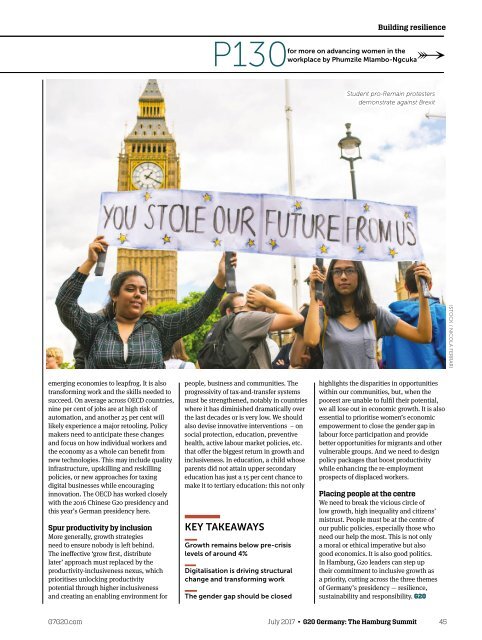G20-Germany-Hamburg-2017
mo.rami@trmg.co.uk
mo.rami@trmg.co.uk
You also want an ePaper? Increase the reach of your titles
YUMPU automatically turns print PDFs into web optimized ePapers that Google loves.
Building resilience<br />
for more on advancing women in the<br />
P130workplace by Phumzile Mlambo-Ngcuka<br />
Student pro-Remain protesters<br />
demonstrate against Brexit<br />
ISTOCK / NICOLA FERRARI<br />
emerging economies to leapfrog. It is also<br />
transforming work and the skills needed to<br />
succeed. On average across OECD countries,<br />
nine per cent of jobs are at high risk of<br />
automation, and another 25 per cent will<br />
likely experience a major retooling. Policy<br />
makers need to anticipate these changes<br />
and focus on how individual workers and<br />
the economy as a whole can benefit from<br />
new technologies. This may include quality<br />
infrastructure, upskilling and reskilling<br />
policies, or new approaches for taxing<br />
digital businesses while encouraging<br />
innovation. The OECD has worked closely<br />
with the 2016 Chinese <strong>G20</strong> presidency and<br />
this year’s German presidency here.<br />
Spur productivity by inclusion<br />
More generally, growth strategies<br />
need to ensure nobody is left behind.<br />
The ineffective ‘grow first, distribute<br />
later’ approach must replaced by the<br />
productivity-inclusiveness nexus, which<br />
prioritises unlocking productivity<br />
potential through higher inclusiveness<br />
and creating an enabling environment for<br />
people, business and communities. The<br />
progressivity of tax-and-transfer systems<br />
must be strengthened, notably in countries<br />
where it has diminished dramatically over<br />
the last decades or is very low. We should<br />
also devise innovative interventions – on<br />
social protection, education, preventive<br />
health, active labour market policies, etc.<br />
that offer the biggest return in growth and<br />
inclusiveness. In education, a child whose<br />
parents did not attain upper secondary<br />
education has just a 15 per cent chance to<br />
make it to tertiary education: this not only<br />
KEY TAKEAWAYS<br />
Growth remains below pre-crisis<br />
levels of around 4%<br />
Digitalisation is driving structural<br />
change and transforming work<br />
The gender gap should be closed<br />
highlights the disparities in opportunities<br />
within our communities, but, when the<br />
poorest are unable to fulfil their potential,<br />
we all lose out in economic growth. It is also<br />
essential to prioritise women’s economic<br />
empowerment to close the gender gap in<br />
labour force participation and provide<br />
better opportunities for migrants and other<br />
vulnerable groups. And we need to design<br />
policy packages that boost productivity<br />
while enhancing the re-employment<br />
prospects of displaced workers.<br />
Placing people at the centre<br />
We need to break the vicious circle of<br />
low growth, high inequality and citizens’<br />
mistrust. People must be at the centre of<br />
our public policies, especially those who<br />
need our help the most. This is not only<br />
a moral or ethical imperative but also<br />
good economics. It is also good politics.<br />
In <strong>Hamburg</strong>, <strong>G20</strong> leaders can step up<br />
their commitment to inclusive growth as<br />
a priority, cutting across the three themes<br />
of <strong>Germany</strong>’s presidency — resilience,<br />
sustainability and responsibility. <strong>G20</strong><br />
G7<strong>G20</strong>.com July <strong>2017</strong> • <strong>G20</strong> <strong>Germany</strong>: The <strong>Hamburg</strong> Summit 45
















